Best Construction Project Management Software
Best construction project management software are Project manager, Fieldwire, PROCORE, OpenProject, Zoho Projects, and BuilderStorm. Construction project tracking software manages all the construction projects and ensures the task is completed before the delivery date with the platform.



No Cost Personal Advisor
List of 20 Best Construction Project Management Software
Category Champions | 2024
A project management software you'll enjoy using
Monday.com is a web-based construction project management platform that assists teams in better planning, monitoring, and managing their projects. This enables teams to interact with each other and share updates with its easy-to-use interface. Moreover, Monday.com helps you create different roadmaps for your goals and projects. Read monday.com Reviews
Explore various monday.com features, compare the pricing plans, and unlock the potential of seamless operations by selecting the right software for your business.
Features
View all monday.com Features- Recurring Task Management
- Accounting Integration
- Due date tracking
- Field Sales Management
- Data Imports/Exports
- Push Notifications
- Agile Methodologies
- Functions / Calculations
Pricing
monday.com Caters to
- StartUps
- SMBs
- Agencies
- Enterprises
Software by Mango Technologies
ClickUp is the complete Task management software. Provide parallel features of Collaboration and Project management. Users can design and assign the task to be sent just for particular things. The notification alerts the employee to the deadline and productive chart. Read ClickUp Reviews
Explore various ClickUp features, compare the pricing plans, and unlock the potential of seamless operations by selecting the right software for your business.
Features
View all ClickUp Features- Task Tracking
- Task Scheduling
- Task Planning
- Time Tracking
- Gantt Charts
- Progress Tracking
- Recurring Tasks
- Collaboration
Pricing
ClickUp Caters to
- StartUps
- SMBs
- Agencies
- Enterprises
Master your team's time
Resource Guru is the fast, flexible way to schedule teams and get work done. Manage people, equipment, and meeting rooms in one place. Track availability in real-time and assign work in seconds. Analyze workloads across clients and projects with insightful reports. Read Resource Guru Reviews
Explore various Resource Guru features, compare the pricing plans, and unlock the potential of seamless operations by selecting the right software for your business.
Features
View all Resource Guru Features- Resource Management
- Employee Directory
- Equipment Tracking
- Reporting
- Equipment Management
- Project Tracking
- Resource Capacity Planning
- Employee Scheduling
Pricing
Resource Guru Caters to
- StartUps
- SMBs
- Agencies
- Enterprises
Software by Teamwork
TeamWorks is a cloud-based help desk software. It is suitable for small and medium-size organizations. It includes many functionalities like payroll management, biometric time management for track employee time. Read Teamwork Reviews
Explore various Teamwork features, compare the pricing plans, and unlock the potential of seamless operations by selecting the right software for your business.
Features
View all Teamwork Features- Approval Process Control
- Client Portal
- Alerts/Notifications
- Resource Management
- Task Board View
- Workflow Management
- Create Subtasks
- Compliance Management
Pricing
Teamwork Caters to
- StartUps
- SMBs
- Agencies
- Enterprises
Contenders | 2024
The Most Affordable All-in-One Construction Manage
Foreman is one of the best construction project management tools for contractors and construction companies. It offers a number of tools that help construction teams manage their projects more successfully, from the early planning stages to the project's completion. For construction companies juggling with multiple projects, this is the right construction task management software. Read Contractor Foreman Reviews
Explore various Contractor Foreman features, compare the pricing plans, and unlock the potential of seamless operations by selecting the right software for your business.
Features
View all Contractor Foreman Features- Service History
- Scheduling
- Electrical Estimating
- Recurring Appointments
- Commercial/Industrial
- Photo Capture
- People Tracking
- Audit Trail
Pricing
Contractor Foreman Caters to
- StartUps
- SMBs
- Agencies
- Enterprises
Software by Octopusapp Inc
If you’re looking for a unified platform for scheduling, quotes, client database, invoicing, and more, then Jobber is one of the best client management software solutions available in the market. The professionalism, dedicated support, and on-demand service offered by this cloud-based platform are exceptional. Read Jobber Reviews
Explore various Jobber features, compare the pricing plans, and unlock the potential of seamless operations by selecting the right software for your business.
Features
View all Jobber Features- Work order management
- Service History Tracking
- Business Operations
- Job Forms
- Mobile Access
- Time & Attendance
- Sales Proposal
- Inventory Management
Pricing
Jobber Caters to
- StartUps
- SMBs
- Agencies
- Enterprises
Contenders | 2024
Software by Smartsheet Inc.
Smartsheet is the ideal construction project software for construction companies that want to streamline their projects. In order to facilitate team collaboration and improve project management, Smartsheet, a cloud-based project management tool, provides a number of capabilities. Teams can communicate effectively, organize and track their work, and make choices based on real-time data, thanks to its user-friendly design. Read Smartsheet Reviews
Explore various Smartsheet features, compare the pricing plans, and unlock the potential of seamless operations by selecting the right software for your business.
Features
View all Smartsheet Features- Mobile Access
- Inventory Management
- Feedback Management
- Reporting/Analytics
- Business Process Automation
- Access Controls/Permissions
- Activity Dashboard
- Goal Setting / Tracking
Pricing
Smartsheet Caters to
- StartUps
- SMBs
- Agencies
- Enterprises
Category Champions | 2024
Conquer chaos. Exceed expectations.
An online construction project management software, Zoho Projects enables teams to schedule, monitor, and work together on projects in real-time. You can follow every job and team activity using Zoho Projects. Teams may manage their projects more effectively and accomplish their objectives with the help of a variety of capabilities that are provided by this tool. Read Zoho Projects Reviews
Explore various Zoho Projects features, compare the pricing plans, and unlock the potential of seamless operations by selecting the right software for your business.
Features
View all Zoho Projects Features- Application Integration
- Charts & Reporting
- Progress Tracking
- Task Management
- Email Integration
- Daily Reports
- Create Subtasks
- Mobile Access
Pricing
Free
$ 0
Up to 3 users
Premium
$ 4
User/Month, Billed Annually
Enterprise
$ 9
User/Month, Billed Annually
Zoho Projects Caters to
- StartUps
- SMBs
- Agencies
- Enterprises
Emergents | 2024
Software by JobProgress
JobProgress is a web-based construction project management software that offers a plethora of features for service businesses, including home improvement, construction, and landscaping. It enables service businesses to manage their projects, clients, and employees from a centralized platform. Learn more about JobProgress
Explore various JobProgress features, compare the pricing plans, and unlock the potential of seamless operations by selecting the right software for your business.
Features
View all JobProgress Features- Time Management
- Subcontractor Management
- Scheduling
- Contractor Database
- Quotes / Estimates
- Historical Database
- Customer Management
- Customizable Templates
JobProgress Caters to
- StartUps
- SMBs
- Agencies
- Enterprises
Category Champions | 2024
Powerful collaboration tool for teams of all sizes
Construction teams can easily plan, carry out, and monitor their projects with Wrike, a potent construction project software. Its extensive feature set and user-friendly design make it a popular option for managing building projects. Software users can develop risk management plans, evaluate the likelihood and severity of risks, and develop risk reduction tactics. Read Wrike Reviews
Explore various Wrike features, compare the pricing plans, and unlock the potential of seamless operations by selecting the right software for your business.
Features
View all Wrike Features- Approval Process Control
- Due date tracking
- Multi-board
- For Brokers
- Online Calendar
- Task Planning
- Task Scheduling
- Documentation Management
Pricing
Free
$ 0
User/Month
Team
$ 10
User/Month
Business
$ 25
User/Month
Wrike Caters to
- StartUps
- SMBs
- Agencies
- Enterprises
Emergents | 2024
Software by Fieldwire
Fieldwire is a construction project management software designed specifically for the construction industry. It provides a range of features that enable construction teams to manage their projects more efficiently, from the initial planning phase to the final delivery of the project. This is one of the best building project management software with advanced features and great customer support. Learn more about Fieldwire
Explore various Fieldwire features, compare the pricing plans, and unlock the potential of seamless operations by selecting the right software for your business.
Features
View all Fieldwire Features- Collaboration
- Residential
- Incident Reporting
- Work order management
- Drawings Integration
- Time Clock
- Mobile Access
- Change Orders
Fieldwire Caters to
- StartUps
- SMBs
- Agencies
- Enterprises
Emergents | 2024
Software by PlanRadar
PlanRadar is a digital task management, communication, and reporting platform that streamlines end-to-end project management for the entire building lifecycle. From plan to build to operation, PlanRadar has solutions available for all stages of a construction project. Learn more about PlanRadar
Explore various PlanRadar features, compare the pricing plans, and unlock the potential of seamless operations by selecting the right software for your business.
Features
View all PlanRadar Features- Mobile Access
- Commercial
- Change Orders
- Subcontractor Management
- Incident Reporting
- Customizable Templates
- Time & Expense Tracking
- Offline Access
Pricing
Basic
$ 49
Per Month
Starter
$ 159
Per Month
Pro
$ 239
Per Month
PlanRadar Caters to
- StartUps
- SMBs
- Agencies
- Enterprises
Contenders | 2024
Software by Procore Technologies
Procore is a cloud-based construction project management software for the construction industry that offers a plethora of functionalities for managing construction projects from start to finish. With a single platform, Procore enables real-time collaboration, reduced rework, and streamlined project workflows for construction industry experts. Read PROCORE Reviews
Explore various PROCORE features, compare the pricing plans, and unlock the potential of seamless operations by selecting the right software for your business.
Features
View all PROCORE Features- Bid Management
- Workflow Management
- Job Scheduling
- Contract Management
- Residential Properties
- Accounts payable
- Payroll Management
- Timesheet Management
PROCORE Caters to
- StartUps
- SMBs
- Agencies
- Enterprises
Emergents | 2024
Software by Buildertrend Solutions Inc
Buildertrend is the best construction project management software for the construction industry. Users can build and maintain project plans using Buildertrend in a systematic way. Teams may see project schedules, dependencies, and critical path analysis using the Gantt chart view it offers. Learn more about Buildertrend
Explore various Buildertrend features, compare the pricing plans, and unlock the potential of seamless operations by selecting the right software for your business.
Features
View all Buildertrend Features- Cash Management
- Job Scheduling
- Customizable Reporting
- Scheduling
- Project Planning
- Bid Management
- Payroll Management
- Job Costing
Pricing
Starting
$ 99
Per Month
Buildertrend Caters to
- StartUps
- SMBs
- Agencies
- Enterprises
Contenders | 2024
Cloud-based construction software
ESUB is a web-based construction project management software that is designed to streamline project management for residential builders and remodelers. ESUB provides robust financial management tools that allow users to track project costs, create estimates, and generate invoices. Users can create and manage budgets, track expenses, and monitor project profitability. Read ESUB Reviews
Explore various ESUB features, compare the pricing plans, and unlock the potential of seamless operations by selecting the right software for your business.
Features
View all ESUB Features- Payroll Management
- Task Management
- Project Management
- Cash Management
- Project Planning
- Service Management
- Job Costing
- Incident Reporting
ESUB Caters to
- StartUps
- SMBs
- Agencies
- Enterprises
Emergents | 2024
Construction Management Software for Residential C
CoConstruct is a cloud-based construction project management tool for the building industry that is made to make project management easier for home builders and remodelers. From early estimates to project completion, it offers a complete set of tools to manage every facet of a construction project. CoConstruct also provides numerous features for tracking time and labor costs. Learn more about CoConstruct
Explore various CoConstruct features, compare the pricing plans, and unlock the potential of seamless operations by selecting the right software for your business.
Features
View all CoConstruct Features- Data Entry
- Incident Reporting
- Project Planning
- Staff Calendar
- Multiple Billing Rates
- Project Scheduling
- Time & Attendance
- Subcontractor Management
Pricing
Core
$ 199
Per Month
CoConstruct Caters to
- StartUps
- SMBs
- Agencies
- Enterprises
Emergents | 2024
Software by RedTeam Software, LLC
RedTeam is a cloud-based construction task management software for the building industry that offers a number of tools to assist contractors in managing their projects more successfully. Users may control budgets, boost team member collaboration, and expedite project workflows with the help of the software. A consolidated platform for document management is offered by RedTeam. Users can upload and save plans, drawings, and other project materials in one place. Learn more about RedTeam
Explore various RedTeam features, compare the pricing plans, and unlock the potential of seamless operations by selecting the right software for your business.
Features
View all RedTeam Features- Payroll Management
- Workflow Management
- Inventory Management
- Procurement Management
- Contract Management
- Purchase Management
- Billing & Invoicing
- Bid Management
Pricing
Construction Expert
$ 0
Per Month
Construction Professional
$ 49
User/Month
Construction Enterprise
$ 99
Session/Month
RedTeam Caters to
- StartUps
- SMBs
- Agencies
- Enterprises
Contenders | 2024
Manage Your Projects Effectively and Efficiently
With ProjectManager, the top construction project management software, constructors can effectively plan, oversee, and carry out their construction projects. This is an all-inclusive project management tool for construction companies that offers a selection of functionalities for managing project budgets, schedules, resources, and risks. Users of ProjectManager can construct project plans that include resource allocation, task dependencies, project timetables, and budget tracking. Read ProjectManager Reviews
Explore various ProjectManager features, compare the pricing plans, and unlock the potential of seamless operations by selecting the right software for your business.
Features
View all ProjectManager Features- Task Management
- Project Budgeting
- Reporting
- File Sharing
- Email Tracking
- Project Templates
- Status Tracking
- Gantt Charts
Pricing
Business
$ 25
User/Month
Team
$ 20
User/Month
Personal
$ 15
User/Month
ProjectManager Caters to
- StartUps
- SMBs
- Agencies
- Enterprises
Emergents | 2024
Software by Bluebeam Software
Bluebeam Revu is one of the best project management software for construction industry designed to help contractors manage their projects more efficiently. The software provides a range of tools to streamline project workflows, manage costs, and improve collaboration among team members. Learn more about Bluebeam Revu
Explore various Bluebeam Revu features, compare the pricing plans, and unlock the potential of seamless operations by selecting the right software for your business.
Features
View all Bluebeam Revu Features- 3D View
- Drawings Integration
- Subcontractor Management
- Slope Routines
- Electronic Plans
- Collaboration
- Assembly Takeoff
- Elevation Checking
Bluebeam Revu Caters to
- StartUps
- SMBs
- Agencies
- Enterprises
ERP & CRM for Real Estate & Infrastructure
StrategicERP is a robust construction project management software developed especially for the real estate industry. It provides a range of features that enable real estate developers, builders, and contractors to manage their projects more efficiently, from the initial planning phase to the final delivery of the project. Read StrategicERP-Real Estate ERP Reviews
Explore various StrategicERP-Real Estate ERP features, compare the pricing plans, and unlock the potential of seamless operations by selecting the right software for your business.
- Document Management
- Budgeting
- Purchase Management
- Inventory Management
- Dashboard
- Inventory control
- Sales Management
- Quotation & Estimates
Pricing
Real Estate CRM
$ 24
User/Month
Real Estate Basic
$ 30
User/Month
Real Estate Medium
$ 48
User/Month
StrategicERP-Real Estate ERP Caters to
- StartUps
- SMBs
- Agencies
- Enterprises
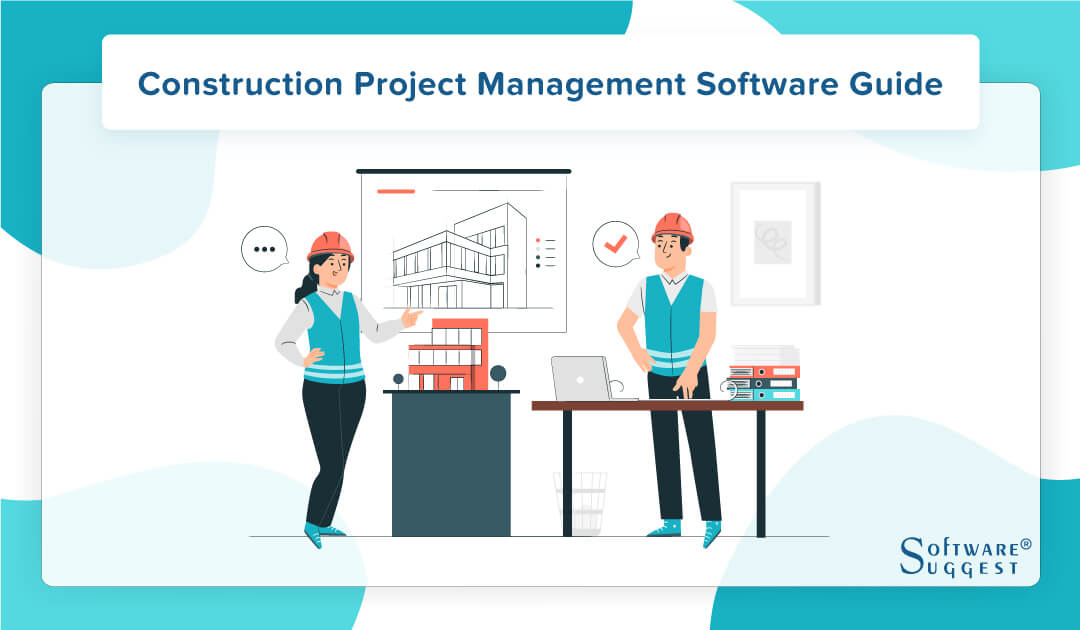
When it concerns the management of a building venture, there are numerous components to monitor. From scheduling to budgeting to communication, it can be overwhelming to manage alone. This is where Construction project management software becomes useful.
Within this buyer's guide, we will explore a few top-rated choices for the best construction management software currently available. Our evaluation will take into account key attributes, pricing, and feedback from users to aid in your selection of the optimal option for your construction project.
Having the right software may make a big difference in keeping your project on the right track and within budget, whether you're a contractor, project manager, or member of a construction team. So let's go into the specifics and examine the options more closely!
What Is Construction Project Management Software?
Construction Project Management tools are a type of technology that helps people manage and oversee construction projects more efficiently. It usually includes tools that help with tasks like scheduling, budgeting, communication, document management, and tracking project progress.
Think of it like having a virtual assistant specifically designed for construction projects. The program is capable of assisting you in monitoring deadlines, finances, and assets, allowing you to ensure that everything remains on schedule and within financial limits. Additionally, you can utilize it to correspond with your team and interested parties, exchange files, and produce updates on the advancement of the project.
When opposed to organizing everything manually, using the best project management software for construction can save a ton of time and work. It can also support lowering the likelihood of mistakes and misunderstandings, which may result in delays and additional expenditures. So, if you're managing a construction project, think about adopting this kind of software to make it go more smoothly!
Benefits of Construction Project Management Software
Construction project software offers a wide range of benefits for businesses operating in the construction industry. From improved collaboration to increased financial visibility, the software provides a comprehensive platform for managing construction projects more efficiently. Here, we will explore six key benefits of using Construction task management software.
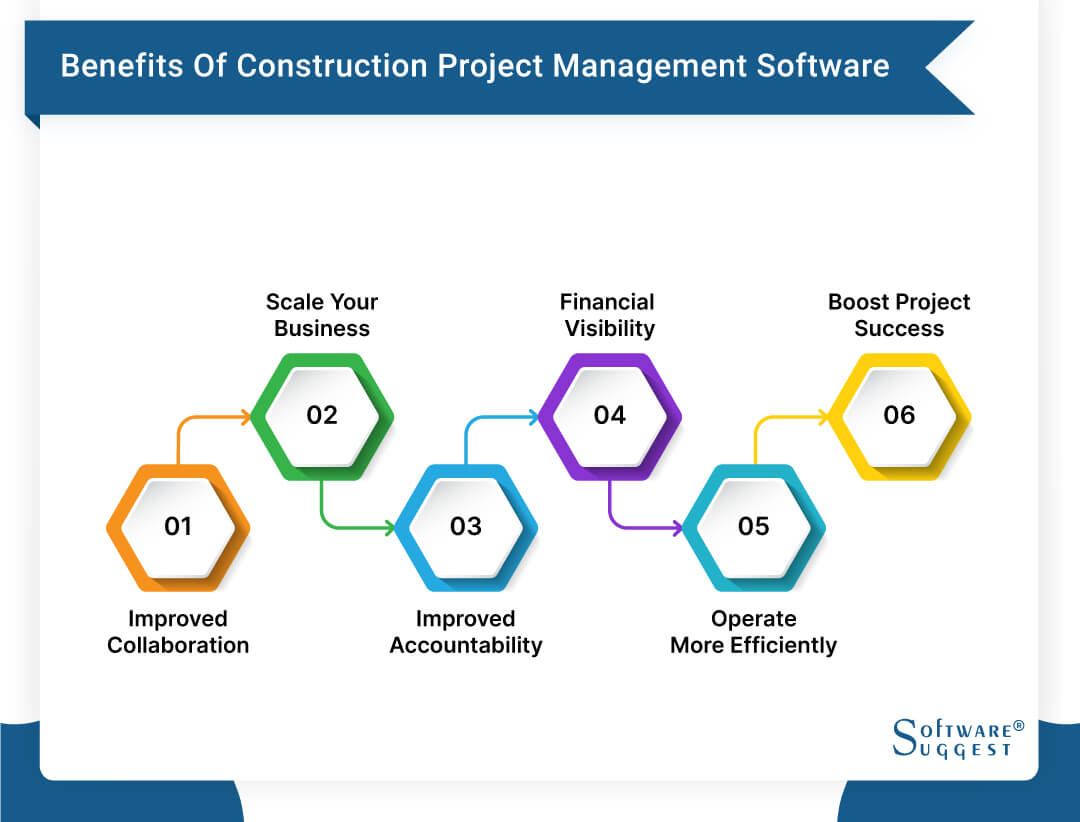
-
Improved collaboration
Numerous parties are involved in construction projects, including clients, suppliers, engineers, contractors, subcontractors, and architects. It is essential for these stakeholders to work together effectively to finish the project on schedule and within budget.
By offering one single platform for communication and document management, construction software enables all parties to collaborate successfully. The software lowers the possibility of misunderstandings and miscommunications by enabling team members to share files, comments, and updates in real-time.
The software can also assist in ensuring that everyone concerned is aware of the project's status, budget, and schedule. Additionally, it enables explicit communication of roles, due dates, and milestones, ensuring that everyone is aware of their duties within the project.
Businesses can decrease the likelihood of delays, rework, and additional expenditures by adopting construction software to enhance cooperation, leading to a more successful and economic project.
-
Scale your business
The ability to scale up operations is yet another important benefit of employing construction software for firms. Managing construction projects manually becomes more difficult as they grow bigger and more complicated.
Businesses may manage bigger projects more effectively by using the resources that construction project management software offers them. The software eliminates the need for manual monitoring and collaboration by enabling centralized project tracking, budget management, and scheduling.
-
Improved accountability
Construction projects involve a large number of entities, each of which has certain obligations to meet. It is essential to manage these responsibilities and time constraints effectively to guarantee the project's timely completion and financial viability.
By offering a unified platform for monitoring project progress, milestones, and deadlines, construction project management software aids firms in increasing responsibility. The program enables companies to spot possible delays and take action before they turn into major issues.
-
Financial visibility
Any building project must have clear financial visibility. Due to several reasons like fluctuating material prices, rising labor expenses, and unforeseen delays, construction projects can suddenly become more expensive than originally anticipated. Budget overruns and large losses for businesses might result from this.
Businesses can gain insights into their projects and real-time financial data via construction project management software. Businesses can use this information to make wise judgments about their expenditure, avoid going overboard, and spot areas where they can reduce expenses.
-
Operate more efficiently
Construction project management tools streamline establishment procedures and boost efficiency. The construction project management system can mechanize tasks such as managing tasks, assigning resources, and scheduling projects. By automating these processes, establishments can curtail errors and delays and save both time and money.
Moreover, the software can monitor employee efficiency, handle certifications, and oversee workforce performance. Establishments can leverage this feature to optimize their workforce and ensure that employees possess the necessary training and qualifications to execute their duties proficiently.
-
Increase the number of projects finished on schedule and within budget
For businesses to maintain their reputation and profitability, building projects must be finished on schedule and under budget. However, managing numerous projects at once may be difficult, and building projects frequently run late or over budget.
By offering real-time data and insights into project progress, construction project management software can assist businesses in completing more projects on schedule and under budget. The program enables firms to take corrective action by spotting possible delays and problems before they develop into serious difficulties.
Features of Construction Project Management Software
Construction project tracking software is a powerful tool that can assist construction establishments in managing projects more efficiently. It entails several functions that make it easier to handle finances, monitor expenditures, and arrange documentation. Let's explore some of the essential features of construction project management solutions.
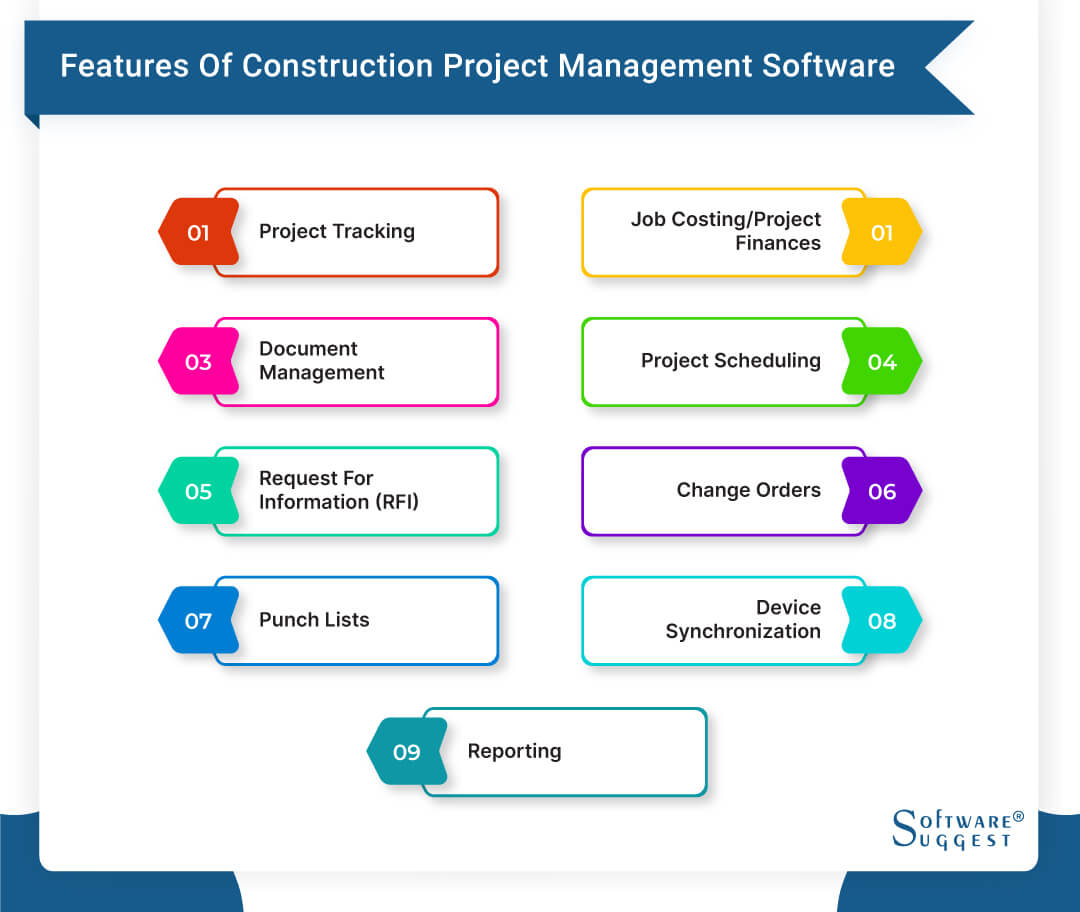
-
Project tracking
Monitoring project progress is an essential aspect of construction project planning tools. This feature allows establishments to have a real-time view of the project's advancement.
Thus, enabling them to detect possible issues before they escalate into significant problems. With this feature, businesses can monitor vital project metrics such as task completion rates, deadlines, and milestones.
Construction project management software empowers construction project managers to assign tasks, supervise their execution, and monitor progress. The software also provides a centralized platform where team members can communicate, share updates, and collaborate on tasks.
-
Job costing/project finances
Any construction project's success depends on managing work costing and project financing. Establishments can track costs in real-time, keep track of project expenses, and make sure that projects are profitable thanks to the sophisticated job costing and project finance tools offered by construction project management software.
Establishments can use the software to develop specific budgets for each project, monitor spending against the budget, and provide reports that demonstrate the project's financial health. The danger of cost overruns can be decreased for firms by using construction project management software to anticipate expenses accurately.
By managing job costing and project finances more effectively, establishments can identify areas where they can cut costs, optimize their resources, and increase profitability. The software provides visibility into the financial health of the project, enabling businesses to make data-driven decisions that improve their bottom line.
-
Document management
Any construction project's success depends on managing work costing and project financing. Businesses can track costs in real-time, keep track of project expenses, and make sure that projects are profitable thanks to the sophisticated job costing and project finance tools offered by construction project management software.
Businesses can use the software to develop specific budgets for each project, monitor spending against the budget, and provide reports that demonstrate the project's financial health. The danger of cost overruns can be decreased for firms by using construction project management software to anticipate expenses accurately.
Additionally, firms can design unique workflows and approval procedures for document management using construction project management software, ensuring that the appropriate individuals have access to the appropriate papers at the appropriate times. Version control features in the program make it simpler to track document changes and guarantee that everyone is using the most recent version.
-
Project scheduling
Any construction project must have an efficient schedule in order to succeed. Establishments may more effectively design and manage project schedules thanks to the sophisticated project scheduling tools provided by construction project management software.
Establishments may construct thorough project plans with tasks, deadlines, and dependencies using project scheduling features. Project managers can use the software to assign tasks to team members, set deadlines, and monitor development in real-time. This guarantees that projects stay on course and are finished on schedule.
Additionally, resource management functions are provided by construction project management software, allowing organizations to allocate resources wisely and make sure they have the appropriate personnel and tools on hand to finish the project on schedule.
-
Request for information (RFI)
A vital communication technique in the construction sector is the request for information (RFI). It is used to ask other project participants, including contractors, architects, or engineers, for clarification or more information on a project.
Establishments may manage RFI more efficiently thanks to the sophisticated RFI features provided by construction project management software. RFIs can be created and tracked by enterprises, who can then assign them to the appropriate parties and track their progress in real-time.
RFIs can be handled quickly and effectively with the help of the customizable workflows and approval procedures provided by construction project management software. By doing so, delays are reduced, and every team member working on the project is on the same page.
-
Change orders
Construction projects inevitably involve change orders. They are used to ask for adjustments to the work's scope, schedule, or spending plan. Effective change order management is essential to the accomplishment of any construction project.
Businesses may manage change orders more effectively thanks to the sophisticated change order features provided by construction project management software. Businesses can create, manage, and track change orders in real-time thanks to the software.
Change orders may be handled quickly and effectively with the help of the customizable workflows and approval procedures provided by construction project management software. By doing so, delays are reduced, and all working on the concerned project is on the same page.
-
Punch lists
Construction projects need to include punch lists. They are used to recognize and keep regular track of the tasks that should be finished for the project to be deemed successful. Establishments may handle punch lists more effectively because of the sophisticated punch list features provided by construction project management software.
Businesses may use the software to make and keep track of punch lists, assign jobs to team members, and keep an eye on progress in real-time. Punch list workflows and approval procedures are also adjustable in construction project management software, ensuring that they are handled quickly and effectively.
-
Device synchronization
The need for software that can synchronize data across numerous devices has increased as mobile devices gain popularity in the construction sector. Strong device synchronization capabilities are provided by construction project management software, allowing firms to manage data more effectively.
Businesses may use any device and any location to access project data, thanks to the software. All devices automatically sync data entered into the system, ensuring that all team members have access to the most recent data.
Offline access is another feature of construction project management software that enables team members to access project data even without an internet connection. This makes it possible for projects to proceed even when team members are located remotely.
-
Reporting
Managing construction projects involves an indispensable aspect of reporting. This facilitates monitoring advancements, detecting problems, and arriving at insightful resolutions. Construction Project Management Software is equipped with powerful reporting tools that enable companies to produce reports promptly and effectively.
The software empowers companies to create tailor-made reports that furnish current updates on project progress, expenses, and other essential indicators. Reports can be generated quickly or scheduled to run automatically, ensuring that project stakeholders stay abreast of the latest information.
The ability to customize dashboards is another feature of construction project management software that enables companies to build unique views of project data. This makes it possible for project stakeholders to readily and rapidly get the data they need to make defensible judgments.
Buyers of Construction Project Management Software
When it concerns buying Software for Managing Construction Projects, there exist several potential purchasers, each having distinct requirements and preferences. Here we shall closely examine three of the main kinds of purchasers in the construction sector: main contractors, planners, and technicians.
-
General contractors
General contractors are responsible for managing construction projects from start to finish, and they require software that can help them oversee multiple subcontractors and suppliers, track project progress, manage budgets and schedules, and communicate with clients. Construction Project Management Software can provide these capabilities and more, enabling general contractors to streamline their operations and improve their efficiency.
Some of the key features that general contractors may look for in Construction Project Management Software include project tracking, job costing and project finances, document management, project scheduling, and reporting capabilities. By using these tools, general contractors can stay on top of project timelines and budgets, identify potential issues early on, and ensure that all stakeholders are kept up-to-date throughout the construction process.
-
Designers
In order to effectively convey their design concepts to customers, contractors, and other stakeholders, designers, such as architects and interior designers, need tools that can help them visualize and represent their ideas. Software for construction project management can give designers the resources they need to produce intricate 3D models, communicate plans and requirements with others, and control modifications and revisions throughout the design process.
Additionally, with the aid of construction project management software, designers and other team members—such as general contractors, engineers, and subcontractors—can work together more efficiently. The software may assist in ensuring everybody is on the exact same page and that all design decisions are well-informed and well-documented by offering a central platform for communication and collaboration.
-
Engineers
Engineers, encompassing civil, mechanical, and electrical engineers, bear the responsibility of guaranteeing safety, structural integrity, and compliance with all pertinent building codes and rules of construction projects. They necessitate software that can assist them in handling intricate engineering tasks, such as structural analysis, cost estimation, and material selection.
Engineers can cooperate with other project team members and manage these activities more effectively with the use of construction project management software. Project tracking, job costing and project financing, document management, and change order management are some of the crucial aspects engineers may search for in construction project management software.
Additionally, early-stage problem identification by engineers using building project management software enables them to make necessary adjustments and alterations to ensure that the project satisfies all safety and quality requirements.
-
Subcontractors
Every building endeavor necessitates the services of subcontractors, who are engaged by the principal contractor to execute specialized tasks. Monitoring all the particulars of each project, particularly regarding finances, schedules, and communication, can be a daunting task. This is because subcontractors typically work on multiple projects simultaneously.
The best project management software for construction can help subcontractors in managing their projects more effectively. It provides a central hub for communication and collaboration. The software also delivers real-time alerts on ongoing and upcoming work, which can assist subcontractors in staying organized.
Additionally, providing real-time cost and spending tracking can help subcontractors manage their budgets. Also, the software enables real-time communication between subcontractors and the general contractor, and other subcontractors. Ultimately, it can assist in avoiding delays and keeping the project on schedule.
-
Independent construction managers
Independent construction overseers are engaged by building proprietors or main contractors to supervise the entirety of a construction undertaking. Their duty is to make certain that the project is concluded on schedule, within the financial plan, and adhering to the expected quality standards.
In order to accomplish this task successfully, autonomous construction overseers must possess an all-encompassing awareness of the project, encompassing the financial plan, timetable, communication, and advancement.
Construction project management software can aid autonomous construction overseers in keeping track of all facets of the project. This can be accomplished by supplying a centralized platform for communication, cooperation, and project management.
The software is capable of assisting overseers in monitoring progress, recognizing potential problems or hindrances, and determining the order of priority for tasks.
Additionally, construction project management software can provide instantaneous updates on financial plans and expenditures, allowing overseers to make informed judgments and make certain that the project remains within the financial plan. -
Building owners
Building proprietors are the quintessential investors in construction undertakings, bearing the onus of guaranteeing that the endeavor meets their requirements in terms of eminence, practicality, and esthetics. To execute this task with efficacy, building proprietors must have an all-encompassing perception of the project, encompassing financial plans, timelines, communication, and progression.
The management software for construction projects can facilitate building proprietors in staying abreast of the project's advancement by furnishing real-time updates on financial plans, timelines, and progression. The software can assist proprietors in giving feedback to the general contractor and other team affiliates, ensuring that the endeavor fulfills their requirements.
Furthermore, the construction project management software can help to build proprietors, supervise the financial plan and guarantee that the project remains within the designated funding.
How To Select The Best Construction Project Management Software?
The correct management software can make all the difference when starting a construction project in terms of keeping it on schedule and under budget. Choosing the finest software for your needs might be overwhelming, with so many options available. We'll go over some important things to think about while choosing construction project management software.
-
Cost
The price of the program is one of the most important elements to take into account. Although it might be tempting to opt for the most economical alternative, it is essential to consider the software's comprehensive cost-effectiveness. Although some software solutions may be less expensive up front, they could need to be upgraded or given more functionality.
The cost in proportion to the project's size and scope should also be taken into account. A larger project would call for a more powerful software suite, which might be more expensive. But spending money on the appropriate software can ultimately save time and money by streamlining budget management, project management, and communication.
-
Key Features
The software's primary features should also be taken into account. It's crucial to pick software that can handle the specific requirements of your project. Some essential qualities to consider include the following:
-
Project scheduling and timeline management: This functionality enables you to establish time limits and monitor advancement to guarantee that the project adheres to the timetable.
-
Budget management: Monitoring project costs and remaining within the budget is pivotal to the accomplishment of any building project. Seek software that provides comprehensive budget management characteristics.
-
Communication and collaboration tools: Efficient correspondence among team members is indispensable for a triumphant construction project. Seek software that presents instruments for effortless communication and cooperation among team members.
-
Document management: Construction projects often require extensive documentation, including contracts, plans, and permits. Look for software that offers document management tools to keep all necessary documentation organized and easily accessible.
-
Reporting and analytics: To ensure the triumph of any venture, it is crucial to keep track of advancements and scrutinize information. To obtain insights into a project's progress and efficacy, seek out software that offers reporting and analytical capabilities.
-
-
User reviews
When deciding which construction project management software would suit your needs the best, user reviews are an essential consideration. It's critical to read evaluations from different industry experts to have a better understanding of the efficiency and usability of the product. You can learn a lot about the software's potential and constraints by doing this.
Look for software that has received favorable comments from other members of the building sector when reading user reviews. Positive reviews frequently show that the software has produced positive results for other customers, which is a promising indication that it will likely satisfy your needs as well.
You might ask peers in the sector for recommendations in addition to reading reviews. They might have direct knowledge of the software that enables you to make wise decisions. You may gain a complete understanding of the software solutions accessible to you and identify the ideal one for your needs by asking for advice from colleagues in the sector.
-
Management types
It is essential to consider the sort of management that the program offers when choosing software for building projects. Standard project management characteristics are offered by certain construction project management systems. Others provide more complex ones at the same time, such as 3D modeling and BIM (Building Information Modeling). It is crucial to think about the features that are essential to your establishment's project and make sure the program has them.
Traditional project management features consist of tracking the budget, managing tasks, and employing team collaboration tools. However, BIM and 3D modeling present more advanced features like virtual reality walk-throughs and project visualization tools. Selecting software with advanced features should depend on the size and intricacy of your project since they may not be necessary for smaller projects.
-
Ease of use
The ease of use should be taken into account when choosing construction project management software. The program should be simple to use and intuitive so that team members can execute tasks and traverse the user interface with ease.
If you want software that will be simple to use, look for an interface with clear labels, a tidy layout, and easy navigation. To assist team members in using the software efficiently, the software should also provide training and support resources.
The software's compatibility with other tools and systems that your team might use is another key factor to take into account. For a smooth workflow and greater efficiency, the software should be able to interact with other tools, such as accounting software and scheduling applications.
Top 5 Tools For Construction Project Management: Comparison
Construction project management demands rigorous planning, coordination, and execution in order to be completed successfully. Thankfully, there are many resources available to help project managers maintain their firm and manage their staff. The five best project management software for construction are covered in this section.
|
Name
|
Free Trial
|
Demo
|
Starting Price
|
|---|---|---|---|
Fieldwire |
14 Days |
Yes |
$39/user/month |
ClickUp |
14 Days |
Yes | $5/user/month |
Contractor Foreman |
7 Days |
Yes |
$49/month |
Houzz Pro |
14 Days |
Yes |
$65/month |
Buildertrend |
14 Days |
Yes |
$99/month |
1. Fieldwire
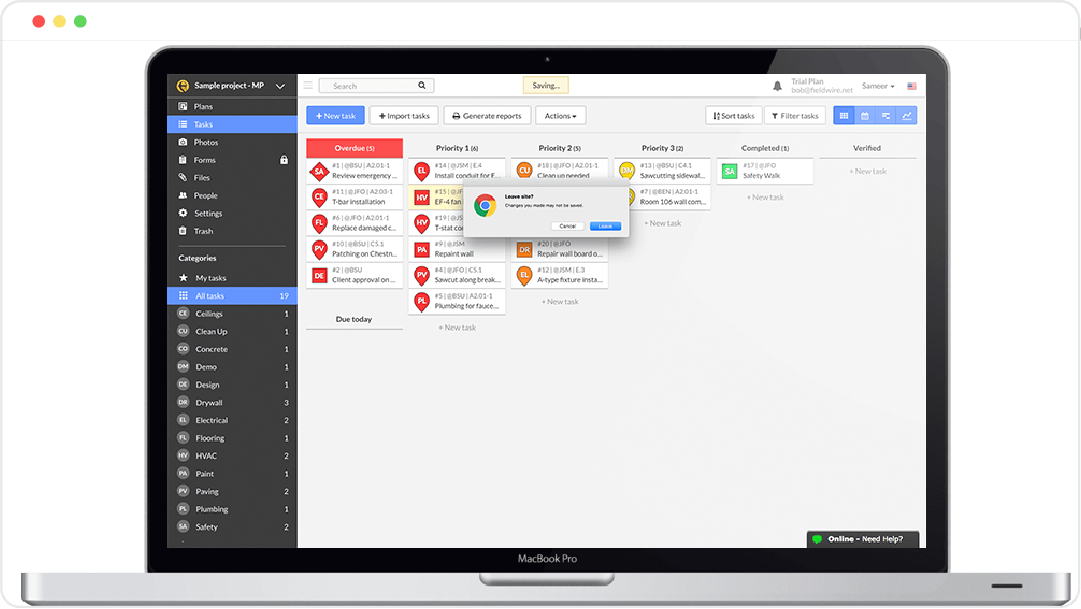
The goal of Fieldwire, a construction management system, is to be the most dependable in the world. The company was established in 2013 with the goal of assisting construction teams in more effective project management, regardless of project size.
This establishment concentrates on enhancing jobsite collaboration and tries to assist businesses in avoiding going over budget or missing deadlines. Fieldwire is a viable option for construction teams wishing to optimize their operations because the founding team has experience expanding businesses and developing profitable products.
Features
- Real-time collaboration feature for easy communication
- Task management to create, assign, and track tasks in one place
- Drawing management feature to easily upload and access project drawings
- Mobile app to access project information and collaborate on-the-go
- Customizable reports to track project progress
Pros
- Organizes data for individual tasks in one location
- Provides access to all team members for fluid teamwork
- Specialized tool for the construction industry
- Mobile app for access and collaboration on-the-go
Cons
- No real templates for repetitive project types
- Projects cannot be organized on the home screen.
Pricing
- Pro-$39 per user per month
- Business-$59 per user per month
- Business plus-$74 per user per month
2. ClickUp
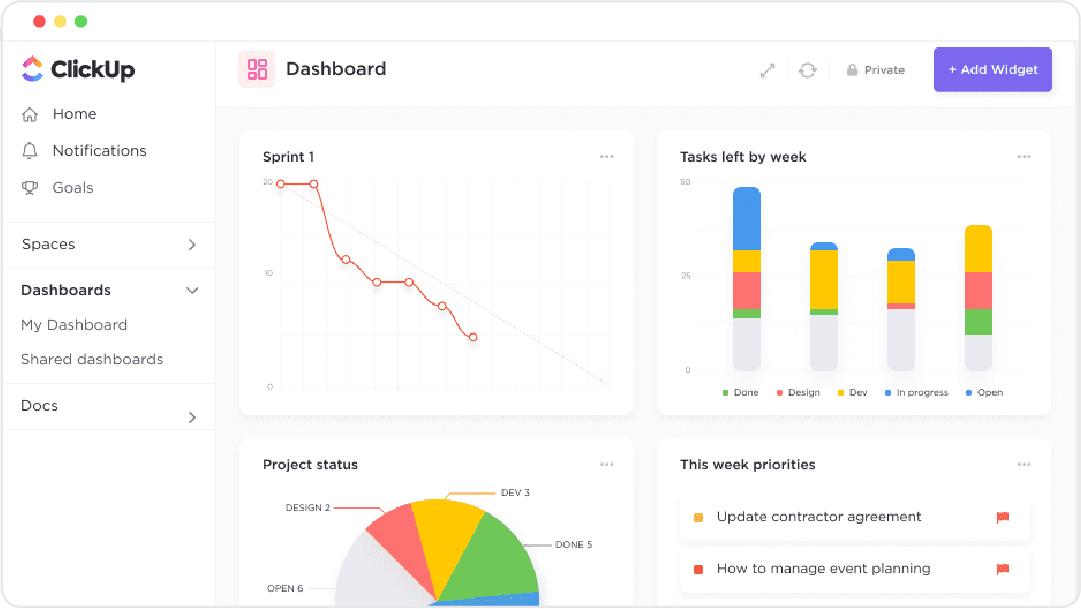
Founded in 2017, Clickup is a complete productivity platform. The business wants to transform project management by offering employees a more effective and fulfilling work environment. Teams can work together on projects using tasks, Docs, Chat, and more at a hub provided by ClickUp.
Establishments from all industries depend on ClickUp as a B2B SaaS provider. For teams aiming to simplify their work processes, ClickUp is a useful tool with an emphasis on productivity and collaboration.
Features
- Multiple views for assignments and undertakings
- Personalization options
- Collaboration and communication tools for teams
- Reporting in real-time
- Capability for keeping track of time
Pros
- Dependable for arranging tasks and monitoring alterations
- Provides an overview of the team's work
- User-friendly for non-technical individuals
Cons
-
Certain users may feel the interface is too complex
Pricing
- Unlimited- $5 per month per user
- Business- $12 per month per user
- Business plus- $19 per month per user
3. Contractor Foreman
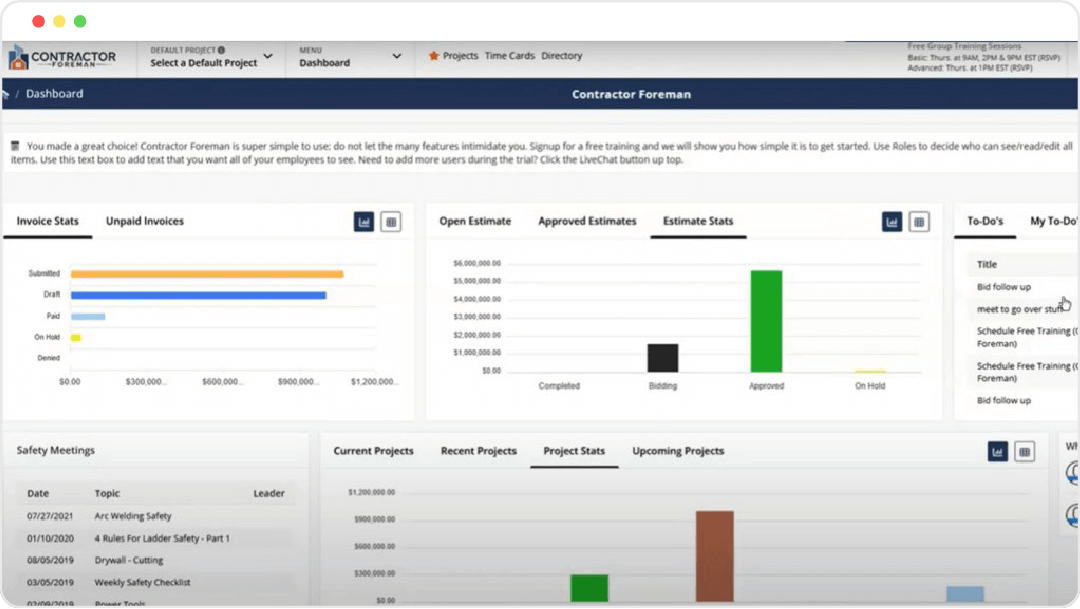
An all-in-one construction management software called Contractor Foreman was developed to give the market improved construction management capabilities. It also has been rated as the most user-friendly software that is also the most reasonably priced. To get construction companies off to the right start, Contractor Foreman offers services, including project management, crew scheduling, and blueprint development.
Features
- Built-in time tracking and job costing
- Mobile app for remote project management
- Ability to create and send estimates and invoices
- Integration with QuickBooks
- Customer portal for progress updates and communication
Pros
- Tailored specifically to contractors
- Accurate project costing with time tracking and job costing features
- Mobile app for remote project management
- Integration with QuickBooks for financial management
Cons
- It may not be as useful for designers or other construction professionals
- Some users may find the interface outdated or difficult to navigate.
Pricing
- Standard- $49 per month
- Plus- $84 per month
- Pro- $123 per month
- Unlimited- $148 per month
4. Houzz Pro
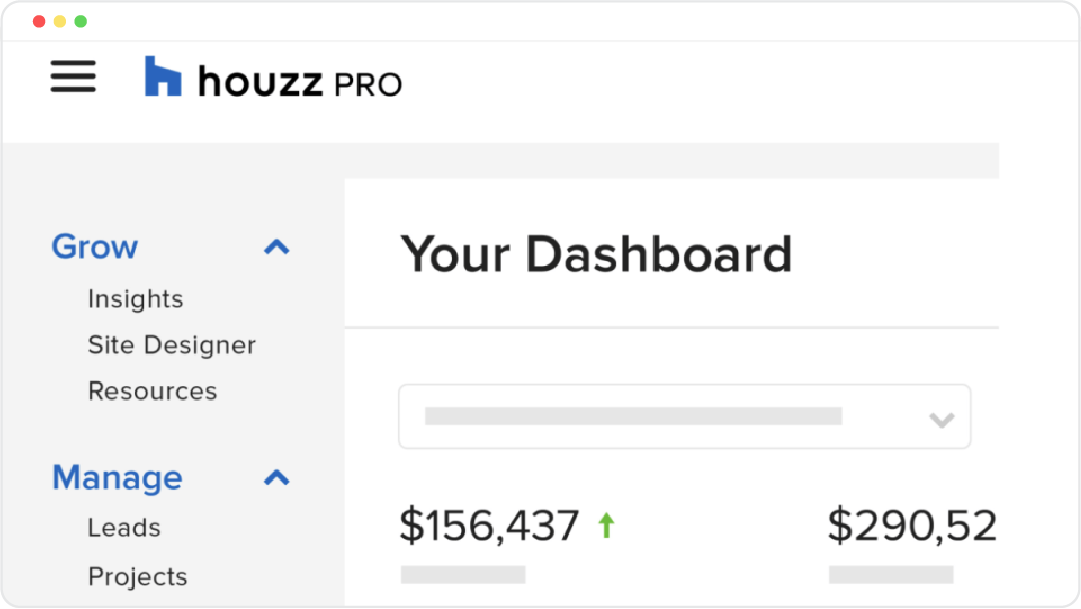
In 2009, Adi Tatarko and Alon Cohen launched the website Houzz, which features interior design ideas. When the website's creators were rebuilding their own homes, they discovered it was challenging to locate ideas and get in touch with professionals in the field. Since then, Houzz has developed into a platform that links homeowners with designers and contractors while providing all-in-one business tools for designers and contractors. Anyone wishing to design or remodel their house will find the website to be a helpful resource because it includes project photographs and evaluations from experts in the field.
Features
- Access to a large community of design professionals and suppliers
- Project tracking and budget management features
- Integration with QuickBooks and a client portal for communication
- Invoice and proposal generation for clients
Pros
- Tailored to the construction industry with helpful features
- Access to a large community of design professionals and suppliers
- Client portal feature for improved communication and trust-building
- Integration with popular accounting tools for financial management
Cons
- Primarily focused on design and renovation, it may not be as useful for larger construction projects
- Some users report occasional slowness or bugs
Pricing
- Starter- $65 per month
- Essential- $99 per month
- Pro- $149 per month
5. Buildertrend
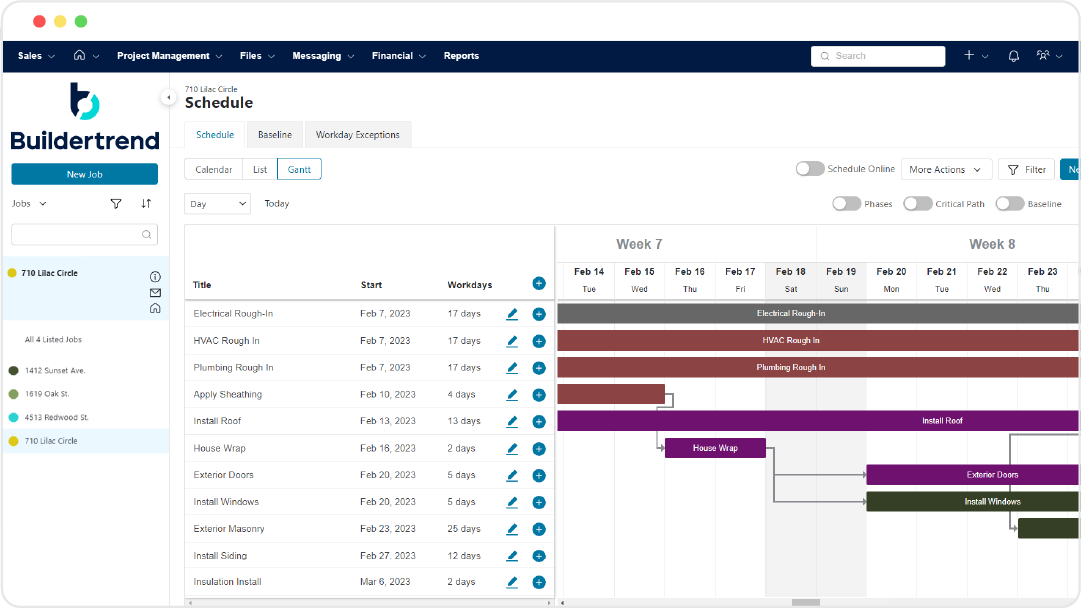
Buildertrend is a construction management software company founded by Dan Houghton, Steve Dugger, and Jeff Dugger. The establishment caters to home builders, renovation experts, and specialized contractors.
Its software streamlines project management, scheduling, and team communication. The company, based in Omaha, Nebraska, has been serving the industry for 17 years. BuilderTrend's work culture is pleasant, cooperative, and energetic, earning it recognition as one of Omaha's Best Places to Work.
Features
- Lead management optimization
- Managing construction projects in the cloud
- Xero and QuickBooks two-way sync
Pros
- It improves client satisfaction
- It helps in the timely payment of trades
- Manages several projects at once
Cons
- New users could have a learning curve
- It might not be appropriate for smaller construction firms
Pricing
- Essential- $99 per month
- Advanced- $399 per month
- Complete- $699 per month
Integrations Of Construction Project Management Software
By automating processes and delivering real-time data on project progress, construction project management software is a potent tool that can assist in streamlining construction projects. But did you realize that combining your project management software with additional technologies can advance the way you handle your building projects? Four of the most popular integrations for building project management software are examined here. They are:-
-
Accounting
Integrating your construction project management software with accounting software can save you time and reduce errors by automating financial processes. With an accounting integration, you can automatically generate invoices, track expenses, and reconcile accounts, all from within your project management software.
QuickBooks, Xero, and Sage are a few of the most well-liked accounting connectors for project management software for the building industry. You can make sure that your financial records are always correct and up-to-date and get a clear picture of the financial health of your project by linking your project management software with your accounting software.
-
Estimating
Estimating is an essential part of construction project management, and integrating your estimating software with your project management software can help you save time and streamline your processes. With an estimating integration, you can quickly generate accurate estimates and import them directly into your project management software, reducing the risk of errors and ensuring that everyone on your team is on the same page.
Some popular estimating integrations for construction project management software include ProEst, Sage Estimating, and PlanSwift. By integrating your estimating software with your project management software, you can improve accuracy, reduce manual data entry, and ensure that your team is working with the most up-to-date information.
-
Takeoff
Takeoff is another critical part of construction project management, and integrating your takeoff software with your project management software can help you save time and improve accuracy. With a takeoff integration, you can quickly and easily import takeoff data directly into your project management software, reducing the risk of errors and ensuring that your team has access to the most up-to-date information.
Some popular takeoff integrations for construction project management software include On-Screen Takeoff, Bluebeam, and PlanSwift. By integrating your takeoff software with your project management software, you can improve accuracy, reduce manual data entry, and ensure that your team is working with the most up-to-date information.
-
Bid management
You may streamline your operations and make sure you never miss an opportunity by integrating your bid management software with your project management software. You can quickly track bids, import bid data into your project management software, and even automatically generate bid documents with a bid management integration. All of this can be done from within your project management program.
Some popular bid management integrations for construction project management software include BuildingConnected, PlanGrid, and Procore. By integrating your bid management software with your project management software, you can improve efficiency, reduce manual data entry, and ensure that your team is always up-to-date on the latest bids.
Conclusion
In conclusion, considering the wide range of solutions on the market, picking the finest construction project management software might be challenging. However, with careful consideration of the features and factors discussed in this buyer guide, you can narrow down your options and choose a software that meets your specific needs and requirements.
Don't forget to take into account the software's customer service, reporting and analytics tools, integration possibilities, and ease of use. Think over the software's price as well as whether it offers a fair return on investment.
By taking the time to evaluate different software options and make informed decisions, you can improve your project management processes, streamline workflows, and enhance collaboration among your team members. Investing in the right software can ultimately help you save time, reduce costs, and increase project success rates.
FAQs
Construction Project Management Software typically has four stages: Planning, Design, Construction, and Operations. The software helps manage each stage with features like scheduling, budgeting, document management, and collaboration.
The cost of a Construction project management system varies depending on the features and functionality required. It can range from free to thousands of dollars per user per month, with most software falling somewhere in between.
Some drawbacks to watching out for in Construction Project Management Software include a steep learning curve, compatibility issues with other software, limited customization options, and a lack of flexibility in adapting to unique project needs.
When evaluating Construction Project Management systems, it's important to ask about the software's features and functionality, pricing and licensing options, customer support and training resources, data security measures, and the vendor's track record and reputation in the industry.
By Countries
By Industries





















